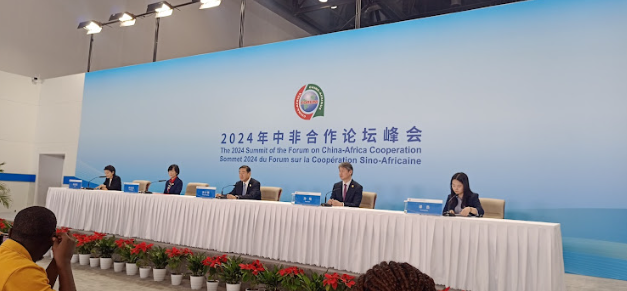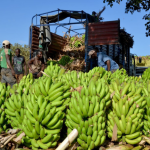On Friday, at least 15 Kenyan companies will present at a conference in Beijing, aiming to garner support from China. These companies will join 408 representatives from African firms across 48 countries participating in the 8th edition of the Chinese and African Entrepreneurs Conference.
The Kenyan companies span various sectors, including agriculture, steel, construction, furniture, pharmaceuticals, tourism, horticulture, and ICT. The conference is expected to draw over 1,000 participants, including 382 representatives from Chinese companies.
“This shows that the Chinese government highly values the cooperation between the business communities from China and Africa,” Zhang Shaogang, China Council for the Promotion of International Trade vice chair said yesterday in a press briefing at the China National Conference Centre.
The conference centre is also the venue of the Forum on China Africa Cooperation summit, where President William Ruto and at least 48 other African heads of state will be discussing ways of deepening cooperation.
The FOCAC summit will end on Friday, coinciding with the Chinese and African Entrepreneurs Conference.
“We designed the conference agenda in alignment with the FOCAC summit,” Shaogang said.
During the conference, 12 entrepreneurs from China and Africa will speak on promoting integration of industrial and supply chains. They will also discuss promoting the development of new industries.
“They will share their insights and experience in cooperation and discuss opportunities,” he said.
Economic and trade cooperation is the anchor and propeller of China-Africa relations.
In recent years, through the leadership of China and African countries, business communities have been deepening communication and cooperation, resulting in increased trade.
China and Africa trade volume hit a record of $202.1 billion in 2023. This is up by almost 11 per cent compared to 2021, hitting a record high for two consecutive years.
“By the end of 2023, the existing direct foreign investment from China to Africa exceeded $40 billion, making China the largest source of foreign investment to Africa.
“At the same time, over the last there years, Chinese companies have created over 1.1 million jobs for the locals. These numbers show that economic and trade cooperation will maintain a strong growth momentum,” Lin Honghong, the deputy director general of the department of international relations at CCPIT, said.
The Chinese and African Entrepreneurs Conference is a premier economic and trade event that significantly influences the business communities of both regions. Established in 2003, the conference is held every three years, alternating between China and Africa. To date, seven editions of the conference have been conducted.
Chinese President Xi Jinping has consistently emphasized the importance of strengthening entrepreneurial cooperation between China and African countries. Shaogang announced that China plans to increase its openness to Africa, facilitating greater importation of goods and products from the continent.
He outlined China’s intentions to deepen collaboration in industrial and supply chains, promote economic integration, and foster interconnected development between China and Africa, thereby delivering mutual benefits. Additionally, Shaogang highlighted China’s commitment to advancing both industrial and supply chain promotion and supporting emerging industries.
China has industries in all sectors and Africa is home to most developing countries.
“Thus China and Africa enjoy great complementarity and its strategic cooperation when it comes to supply and industrial chains,” he said.
“We would like to see that entrepreneurs from those countries enhance their economic and trade cooperation platforms such as the China International Supply Chain Expo,” he said.
“This is to improve the integration of industrial and supply chains, jointly oppose protectionism and keep industrial and supply chains stable and smooth.”
The vice chair of the CCPIT noted that Africa and China have significant potential for collaboration in areas such as the digital economy, green development, and artificial intelligence. Shaogang emphasized the importance for entrepreneurs from both regions to work together in emerging industries and advance the development of new sectors.
Senior Chinese government officials will be attentively listening to the entrepreneurs, aiming to support the most promising business projects. Honghong mentioned that President Xi Jinping’s speech at the FOCAC summit on Thursday will outline the framework for high-level China-Africa economic and trade cooperation in the new era.
This, Honghong added, will generate renewed enthusiasm in China’s commitment to ensuring Africa progresses economically and remains competitive.
“We hope the entrepreneurs from China and Africa can strengthen strategic synergy, increase their communication and dialogue. They should also talk about business opportunities to reach more consensus in cooperation to bring more tangible results to both Chinese and African people,” she said.
Sun Xiao, the CCPIT spokesperson, said the council has been acting as a bridge between government and businesses, between domestic and international efforts and between supply and demand.
In 2006, CCPIT and the African Business Union jointly launched the China Africa Joint Chamber of Commerce and Industry.
Through this cooperation MoUs with 56 counterpart institutions from 36 African countries have been signed.
These MoUs provide opportunities for businesses, especially the emerging ones, to get footholds into the industries they venture into.
CCPIT provides foreign investment guidelines through which emerging businesses can get guidance towards greatness.
This also includes trainings that empower the entrepreneurs with the necessary skills in their ventures.
“CCPIT has established offices in South Africa and Egypt, and is actively looking to establish offices in Ethiopia, Kenya and other African countries,” Xiao said.



